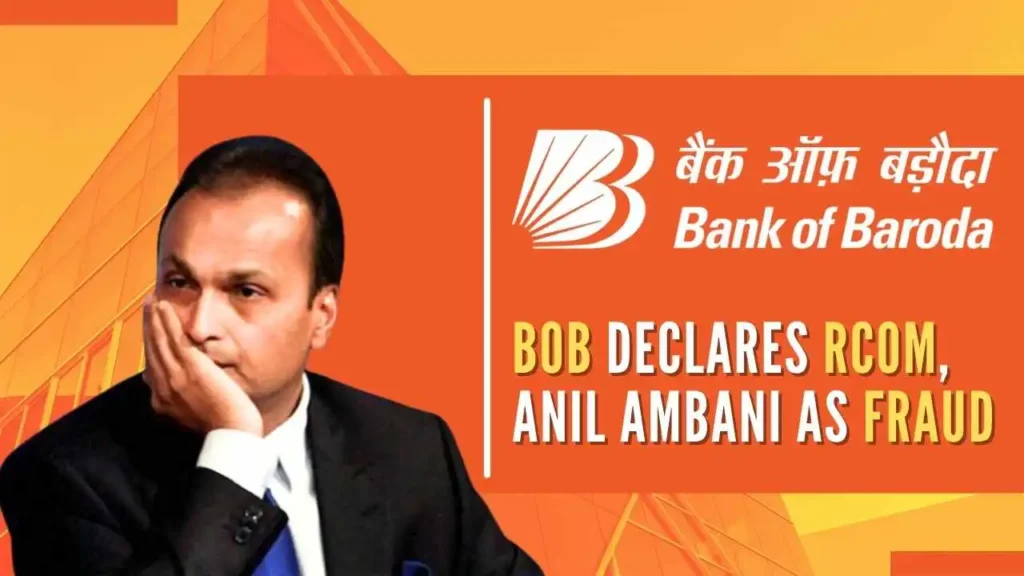Bank of Baroda Classifies RCom Loan: In a significant development in the Reliance Communications (RCom) saga, Bank of Baroda (BoB) has classified the loan account of the insolvent telecom company as fraudulent, citing alleged misutilisation of loans extended over a decade ago. The move follows similar actions by State Bank of India (SBI) and Bank of India (BoI), which had earlier declared RCom’s accounts and its former director, tycoon Anil Ambani, as “fraudulent.”
RCom confirmed receiving a letter from BoB dated September 2, informing the company of the decision. The bank had sanctioned Rs 1,600 crore and an additional Rs 862.50 crore as a line of credit to the telecom giant, totaling Rs 2,462.50 crore. Of this, Rs 1,656.07 crore remained outstanding as of August 28, according to disclosures made by RCom in a regulatory filing.
The loan account had already been classified as a non-performing asset (NPA) since June 5, 2017. BoB stated that the declaration of fraud was based on observations in forensic audit reports and was carried out in accordance with the principles of natural justice. This comes while RCom is undergoing corporate insolvency resolution proceedings to find a buyer who can take over the company and clear its liabilities.
Details of BoB’s Fraud Declaration
Bank of Baroda’s decision follows a forensic audit and internal investigation. Key points include:
- Loan Sanctions: BoB had sanctioned Rs 1,600 crore and a line of credit of Rs 862.50 crore.
- Outstanding Amount: Rs 1,656.07 crore remains unpaid as of August 28.
- NPA Status: The account has been an NPA since June 5, 2017.
- Resolution Status: BoB noted there is currently no active resolution plan approved by the National Company Law Tribunal (NCLT).
The bank cited forensic audit findings as the basis for classifying the loan as fraudulent. Under Indian banking regulations, such classification triggers criminal referrals and bars the borrower from accessing fresh credit from banks or regulated institutions for five years.
Anil Ambani Responds
Anil Ambani, through a company spokesperson, denied all allegations. Key points from the statement include:
- Ambani served as a non-executive director on RCom’s board from 2006 until his resignation in 2019.
- He was never an executive director or Key Managerial Personnel (KMP) and had no role in day-to-day operations or decision-making.
- The action by BoB pertains to events dating back over 12 years.
- The statement called the staggered approach of lenders targeting Ambani selective and unfair.
Ambani’s team emphasized that RCom’s resolution plan, approved unanimously by the Committee of Creditors (CoC) led by SBI in March 2020, remains sub judice before the NCLT and other judicial bodies, including the Supreme Court.
Read about: Rupee Rises 1 Paisa to 88.11 Against U.S. Dollar in Early Trade
Background: RCom Debt and Insolvency
RCom, once a major telecom player in India, has been mired in financial distress for years. The company’s total debt was reported at Rs 40,400 crore as of March. Multiple lenders, including SBI, BoI, and BoB, had previously classified the accounts and loans as non-performing.
The fraudulent classification by banks is a serious regulatory step. It not only escalates the legal and criminal implications for the company and its directors but also prevents access to new loans, further complicating RCom’s ongoing resolution process.

Implications of Fraud Classification
- Criminal Action: Once an account is classified as fraudulent, enforcement agencies may initiate criminal proceedings.
- Credit Ban: Borrowers are barred from availing new loans from banks and regulated institutions for five years.
- Impact on Insolvency Resolution: Fraud classification can complicate corporate insolvency proceedings and may affect the prospects of potential buyers.
Industry experts note that such classifications, especially after a decade of outstanding loans, reflect the increasing scrutiny banks place on high-value corporate lending and misutilisation of funds.
Conclusion
The Bank of Baroda’s decision to classify RCom’s loan as fraudulent marks another pivotal moment in the troubled history of Reliance Communications. While lenders seek accountability for allegedly misused funds, Anil Ambani has firmly denied involvement, emphasizing his non-executive role.
The case underscores the complexities involved in corporate lending, insolvency resolution, and the regulatory mechanisms in place to curb financial mismanagement. With multiple banks now tagging the loans as fraudulent, the matter is likely to be closely monitored by courts and enforcement agencies.
For stakeholders and potential investors, this development signals caution, as the resolution process remains tied up in legal proceedings. Meanwhile, RCom’s creditors and the broader banking sector watch closely, balancing the need for recovery with adherence to due legal process.
Also read: BYD Atto 2 Review: Compact Electric SUV for Europe’s Growing EV Market
FAQs of Bank of Baroda Classifies RCom Loan
1. What does it mean when a loan account is classified as fraudulent?
A fraudulent classification indicates that a bank believes the borrower misused funds or engaged in deceptive practices. It triggers criminal investigations and bars access to new loans for five years.
2. Why was Anil Ambani named in the BoB letter?
BoB named him citing alleged misutilisation of loans sanctioned during his tenure as a director. Ambani, however, denies any involvement in day-to-day operations or decision-making at RCom.
3. How does this affect RCom’s insolvency proceedings?
Fraud classification may complicate the ongoing corporate insolvency resolution process, potentially affecting the approval of resolution plans and the interest of potential buyers.
4. What is the total debt of RCom?
As of March, RCom disclosed a total debt of Rs 40,400 crore. Outstanding loans from BoB alone amount to Rs 1,656.07 crore.
5. Can RCom or Anil Ambani challenge the fraud classification?
Yes, both RCom and Anil Ambani can legally challenge the classification through judicial remedies. The matter is currently sub judice before NCLT and other courts, including the Supreme Court.


